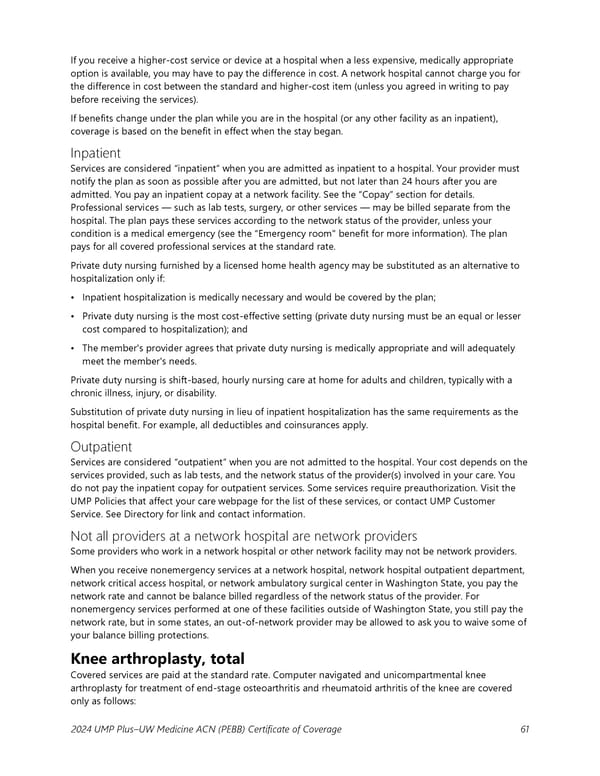If you receive a higher-cost service or device at a hospital when a less expensive, medically appropriate option is available, you may have to pay the difference in cost. A network hospital cannot charge you for the difference in cost between the standard and higher-cost item (unless you agreed in writing to pay before receiving the services). If benefits change under the plan while you are in the hospital (or any other facility as an inpatient), coverage is based on the benefit in effect when the stay began. Inpatient Services are considered “inpatient” when you are admitted as inpatient to a hospital. Your provider must notify the plan as soon as possible after you are admitted, but not later than 24 hours after you are admitted. You pay an inpatient copay at a network facility. See the “Copay” section for details. Professional services — such as lab tests, surgery, or other services — may be billed separate from the hospital. The plan pays these services according to the network status of the provider, unless your condition is a medical emergency (see the “Emergency room" benefit for more information). The plan pays for all covered professional services at the standard rate. Private duty nursing furnished by a licensed home health agency may be substituted as an alternative to hospitalization only if: • Inpatient hospitalization is medically necessary and would be covered by the plan; • Private duty nursing is the most cost-effective setting (private duty nursing must be an equal or lesser cost compared to hospitalization); and • The member's provider agrees that private duty nursing is medically appropriate and will adequately meet the member's needs. Private duty nursing is shift-based, hourly nursing care at home for adults and children, typically with a chronic illness, injury, or disability. Substitution of private duty nursing in lieu of inpatient hospitalization has the same requirements as the hospital benefit. For example, all deductibles and coinsurances apply. Outpatient Services are considered “outpatient” when you are not admitted to the hospital. Your cost depends on the services provided, such as lab tests, and the network status of the provider(s) involved in your care. You do not pay the inpatient copay for outpatient services. Some services require preauthorization. Visit the UMP Policies that affect your care webpage for the list of these services, or contact UMP Customer Service. See Directory for link and contact information. Not all providers at a network hospital are network providers Some providers who work in a network hospital or other network facility may not be network providers. When you receive nonemergency services at a network hospital, network hospital outpatient department, network critical access hospital, or network ambulatory surgical center in Washington State, you pay the network rate and cannot be balance billed regardless of the network status of the provider. For nonemergency services performed at one of these facilities outside of Washington State, you still pay the network rate, but in some states, an out-of-network provider may be allowed to ask you to waive some of your balance billing protections. Knee arthroplasty, total Covered services are paid at the standard rate. Computer navigated and unicompartmental knee arthroplasty for treatment of end-stage osteoarthritis and rheumatoid arthritis of the knee are covered only as follows: 2024 UMP Plus–UW Medicine ACN (PEBB) Certificate of Coverage 61
 UMP Plus–UW Medicine Accountable Care Network (UW Medicine ACN) COC (2024) Page 61 Page 63
UMP Plus–UW Medicine Accountable Care Network (UW Medicine ACN) COC (2024) Page 61 Page 63